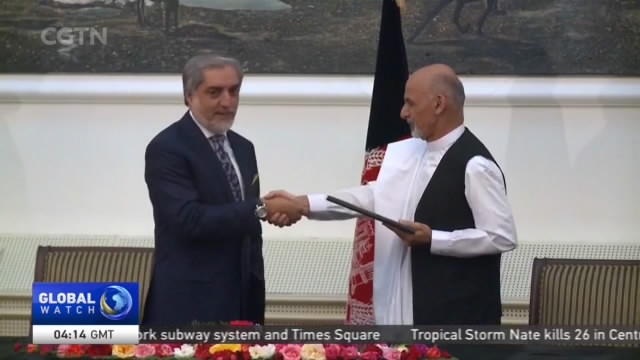
12:39, 07-Oct-2017
War-Torn Afghanistan: 16 Years On: Nation still plagued by conflict since US operation

Today marks the 16th anniversary since the US launched its "Operation Enduring Freedom" in Afghanistan. After nearly two decades, the impacts and long-lasting effects of the operation continue to trouble the country. The security situation remains turbulent, and even intensified, while other problems remain. CGTN's Li Jianhua has more.
Sixteen years ago, just after the September 11 attacks in 2001, former U-S President George W. Bush demanded that the Taliban hand over Osama bin Laden and expel al-Qaeda. But the Taliban declined to extradite him and ignored demands to shut down terrorist bases. Later on October 7th, the US launched Operation Enduring Freedom with other forces, including the United Kingdom and NATO.
GEORGE W. BUSH FORMER US PRESIDENT "On my orders, the United States military has begun to strike, and military isolation of Taliban regime in Afghanistan."
But 16 years on, and the security situation in Afghanistan has not improved. Instead, it's been deteriorating. Big cities such as Kabul have been facing terrorist attacks. The eastern, southern and northern parts of Afghanistan, are still controlled by the Taliban. Moreover, extremist groups are infiltrating eastern parts of the country.
According to the United Nations, the first six months of the year have seen a record of 1,662 civilians killed, and 3,581 others wounded. The death toll is the highest among the 16 years since the US stepped foot in the country. And so far, millions remain displaced.
The gap between the wealthy and poor has been growing in recent years. Kabul's population has exploded, accompanied with high unemployment. Living conditions for citizens have not improved, though more buildings and greater infrastructure has been built.
GHULAM REZA KABUL RESIDENT "We have not seen any changes. Those legislators and government officials invested money and built all those tall buildings. But the poor people have become even poorer."
The medical conditions in Afghanistan are still limited, even though the number of hospitals has increased after the war. The life expectancy in Afghanistan is only 51.3 years, marking it the third lowest in the world. The infant mortality rate, 112.8 over one thousand is the highest in the world.
Though a government has been formed, the 2014 presidential election process has been in constant turmoil, which caused factionalism throughout the Afghan government. And some of the pre-war warlords are still active in politics. All of this leaves the public with a lack of confidence in the government.
KHALI RAHMAN KABUL RESIDENT "We are concerned about the security. Every day we go outside, we are afraid there might be another bomb attack. The fear does not go away until we go back home at the end of the day."
But the fighting has yet to come to an end. The 16 years of US warfare seems to have left insurgents as strong as ever, and Afghanistan's future, in an even more dire situation. Li Jianhua, CGTN.

SITEMAP
Copyright © 2018 CGTN. Beijing ICP prepared NO.16065310-3
Copyright © 2018 CGTN. Beijing ICP prepared NO.16065310-3